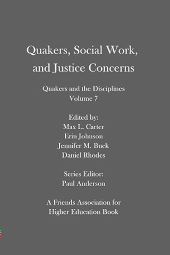Synopsis
In this volume of the Friends Association for Higher Education’s series on Friends and the academic disciplines, ten authors apply theory and history of Quaker work for social change in offering insight into how Friends have approached social work.
This collection of essays is divided into three sections. The first considers theory of social work and change. Christy Randazzo applies the work of John Paul Lederach to a theological understanding of Quaker testimony and social action. Daniel Rhodes shares about his application of Quaker principles in his educational work with social work students. Douglas Bennett describes the history and development of Quaker organizations in addressing social issues.
A second section looks at individual Quakers’ lives and their work. Paul Anderson examines the life of prison reformer Elizabeth Fry, Mark Bredin discusses progressive reformer Lucretia Mott, and Wendy Grab considers the Quaker influences on social work pioneer Jane Addams.
The third section considers collective work of Friends in addressing social issues. Nelson Bingham explores the creation of the first mental hospital, the York Retreat, begun by Friends in England. Max L. Carter describes the work of Friends among Midwestern Indians in the early 1800s. Linda B. Selleck draws from her book Gentle Invaders to share the history of Quaker women’s educational work among African Americans before and after the Civil War. And Jennifer Buck details Quaker involvement in the women’s Suffrage movement.
Volume 7 of the Friends Association for Higher Education’s “Quakers and the Disciplines” series.







